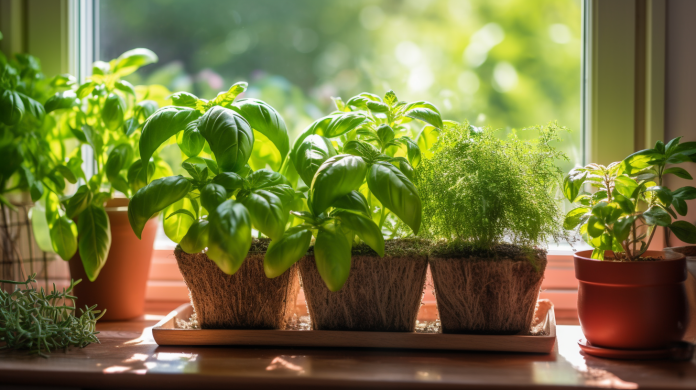Discovering the world of herbs can be an exciting journey for beginners looking to enhance their culinary skills or explore the benefits of natural remedies. In this article, we will explore five popular herbs for beginners that are perfect for those starting out on their herb-growing adventure.
From the aromatic basil to the versatile parsley, these herbs offer a range of flavors and health benefits. Whether you have a green thumb or are just beginning to cultivate your gardening skills, these herbs are sure to delight and inspire.
Basil
What are the various culinary uses of basil and how can beginners incorporate it into their dishes?
Basil is a versatile herb with a distinct flavor that adds a fragrant and refreshing touch to a variety of dishes. There are different varieties of basil, each offering its unique flavor profile.
- Sweet basil, the most common variety, has a peppery and slightly sweet taste, making it perfect for Italian cuisine.
- Thai basil has a stronger flavor with hints of licorice and is commonly used in Thai and Vietnamese dishes.
- Lemon basil adds a citrusy twist to recipes
- Cinnamon basil has a warm and spicy flavor.
For beginners looking to incorporate basil into their dishes, a simple way is to use it in pasta sauces, salads, or homemade pesto. Growing basil indoors is also an option for those with limited space. It requires well-drained soil, adequate sunlight, and regular watering to thrive. It is best to pinch off the flowers to encourage leaf growth and ensure a longer harvest period.
Rosemary
Rosemary is a versatile herb that is commonly used in culinary and medicinal applications. It not only adds a delicious flavor to dishes but also offers numerous benefits for skincare. Here are some of the benefits of using rosemary in cooking and skincare:
- Rich in antioxidants that help fight against free radicals and reduce inflammation.
- Contains antimicrobial properties, making it effective in treating acne and other skin conditions.
- Stimulates blood circulation, promoting a healthy complexion and hair growth.
- Has a refreshing aroma, which can help relieve stress and improve mental clarity.
If you have an interest in growing and caring for rosemary plants at home, here are a few tips:
- Plant it in well-draining soil and place it in a sunny spot.
- Water sparingly as rosemary prefers dry conditions.
- Prune regularly to maintain its shape and encourage new growth.
- Protect it from harsh winter temperatures by bringing it indoors or covering it with a frost cloth.
With its many benefits and easy cultivation, rosemary is a must-have herb for both cooking and skincare.
Mint
Interestingly, mint is an herb that offers a refreshing and versatile addition to both culinary and medicinal practices. The uses of mint in cooking are endless. Its bright and cooling flavor makes it a popular ingredient in both sweet and savory dishes. Mint leaves can be used to garnish salads, add flavor to cocktails, or infused in teas.
Additionally, mint is known for its many health benefits, such as aiding digestion and soothing headaches. Growing mint at home has several advantages. It is a hardy herb that requires minimal care, making it suitable for beginners. Furthermore, having fresh mint readily available allows you to enjoy its flavor and benefits whenever you desire.
Just be cautious, as mint can be invasive and should be contained in a pot or separate area of the garden.
Parsley
Parsley is a versatile herb that offers a range of culinary and health benefits, making it a great choice for beginners looking to experiment with different flavors and enhance their dishes. Here are some key points to know about parsley:
- Health benefits: Parsley is rich in vitamins A, C, and K, and is a good source of antioxidants. It has anti-inflammatory properties and can support healthy digestion. Incorporating parsley into everyday meals can help boost your immune system and promote overall well-being.
- Culinary uses: Parsley can be used as a garnish, added to salads, soups, and sauces, or used as a flavorful ingredient in pesto and marinades. Its bright, fresh taste adds a refreshing touch to dishes.
- Growing and caring for parsley: Parsley is easy to grow and is suitable for beginner herb gardeners. It thrives in well-drained soil and requires regular watering. It can be grown in pots or directly in the ground, and can be harvested throughout the growing season.
- Tips for using parsley: To get the most flavor from parsley, add it towards the end of the cooking process. You can also chop it finely and freeze it in ice cube trays for convenient use.
Incorporating parsley into your meals not only adds flavor but also provides numerous health benefits. Whether you're growing it in your herb garden or buying it from the store, parsley is a versatile and nutritious herb to have in your kitchen.
Thyme
When it comes to culinary herbs for beginners, thyme stands out as a versatile and flavorful option. Thyme not only adds a distinct aroma and taste to dishes but also offers various health benefits. Thyme boasts antioxidant and anti-inflammatory properties, thanks to its richness in vitamins and minerals.
It can boost the immune system, aid in digestion, and promote healthy skin. In terms of culinary uses, thyme pairs well with a wide range of dishes, including meats, vegetables, soups, and stews. Use it fresh or dried, and its leaves can be added whole or chopped. For beginners looking to grow thyme indoors, here are some tips and tricks: provide well-drained soil, place the plant in a sunny location, and water regularly but avoid overwatering. With a little care, you can enjoy fresh thyme all year round.
| Health Benefits of Thyme | Culinary Uses of Thyme | Growing Thyme Indoors |
|---|---|---|
| – Antioxidant properties | – Enhances flavor | – Provide well-drained soil |
| – Anti-inflammatory effects | – Pairs well with meats, vegetables, soups, and stews | – Place in a sunny location |
| – Boosts the immune system | – Can be used fresh or dried | – Water regularly but avoid overwatering |
| – Aids in digestion | – Adds aroma to dishes | – Enjoy fresh thyme all year round |
| – Promotes healthy skin | – Can be added whole or chopped |
Key Takeaways
- Basil, a versatile herb, finds its place in Italian, Thai, and Vietnamese cuisine. It thrives indoors when provided with well-drained soil, ample sunlight, and regular watering.
- Rosemary, another versatile herb, is valued not only in culinary applications but also in skincare. Packed with antioxidants and antimicrobial properties, it flourishes in well-draining soil under abundant sunlight.
- Mint, known for its refreshing and versatile nature, graces both culinary and medicinal practices with its bright and cooling flavor. To control its invasiveness, it's best to grow it in containers.
- Parsley, equally versatile and packed with vitamins and antioxidants, enhances various dishes. Its cultivation is hassle-free, requiring well-drained soil and consistent watering.
Conclusion
In conclusion, these popular herbs are excellent choices for beginners looking to start their herb garden.
Basil, rosemary, mint, parsley, and thyme offer a variety of flavors and aromas that can enhance any dish.
With their easy cultivation and versatile uses in cooking, these herbs are perfect for those new to gardening.
Start experimenting with these herbs and enjoy the fresh and vibrant flavors they bring to your culinary creations.
Please see our supporting article:
The Allure of Growing Herbs
Selecting Suitable Herbs for Jar Gardening



